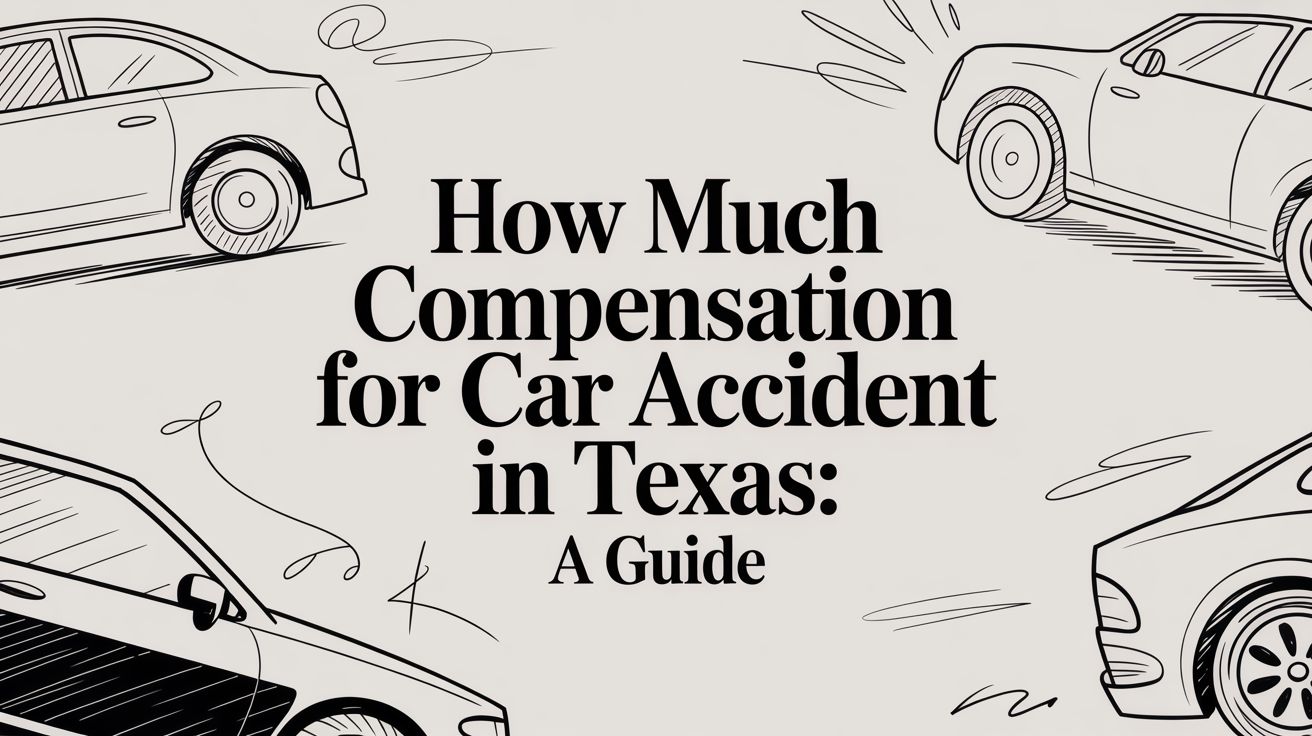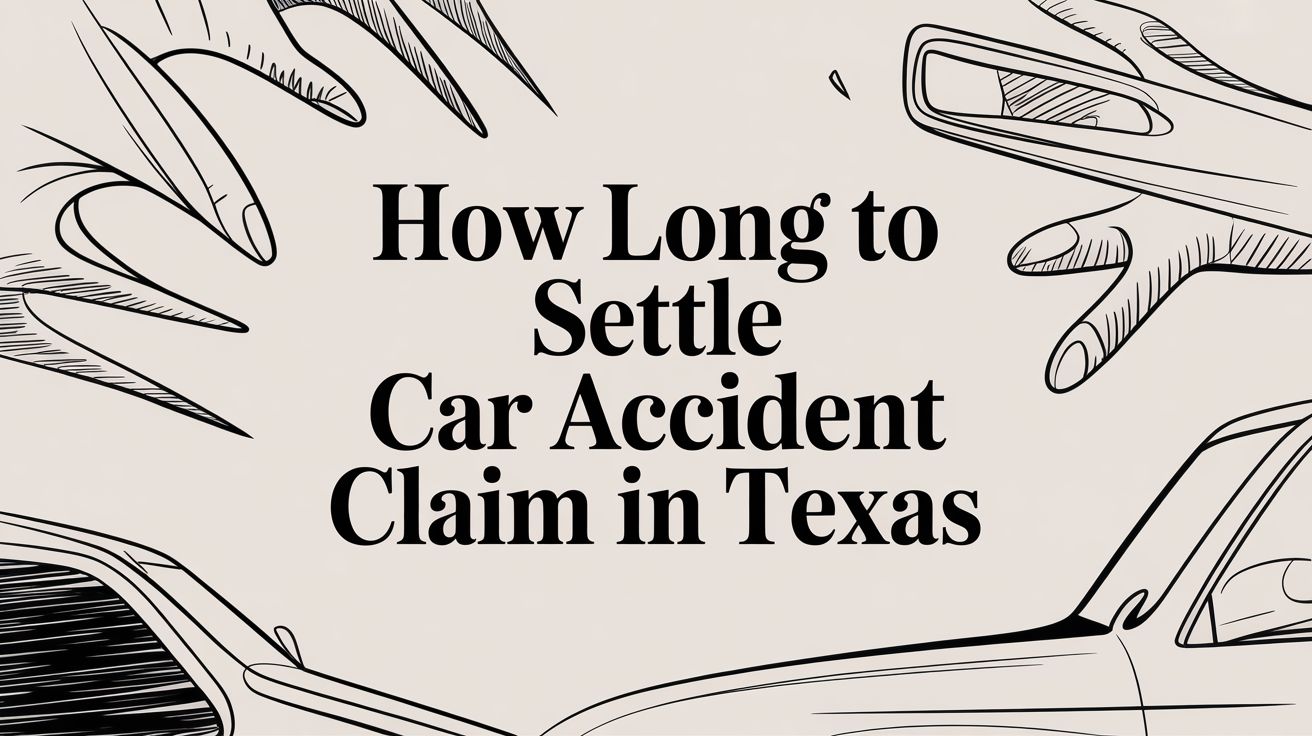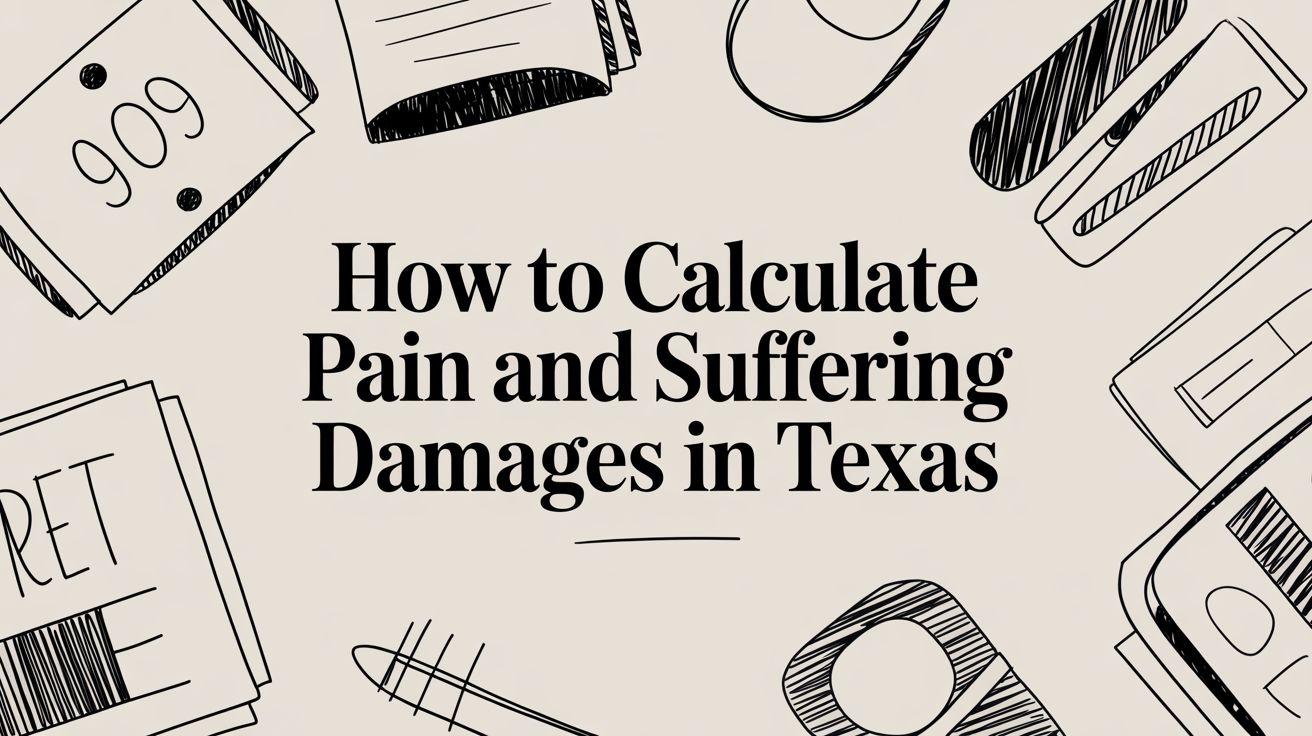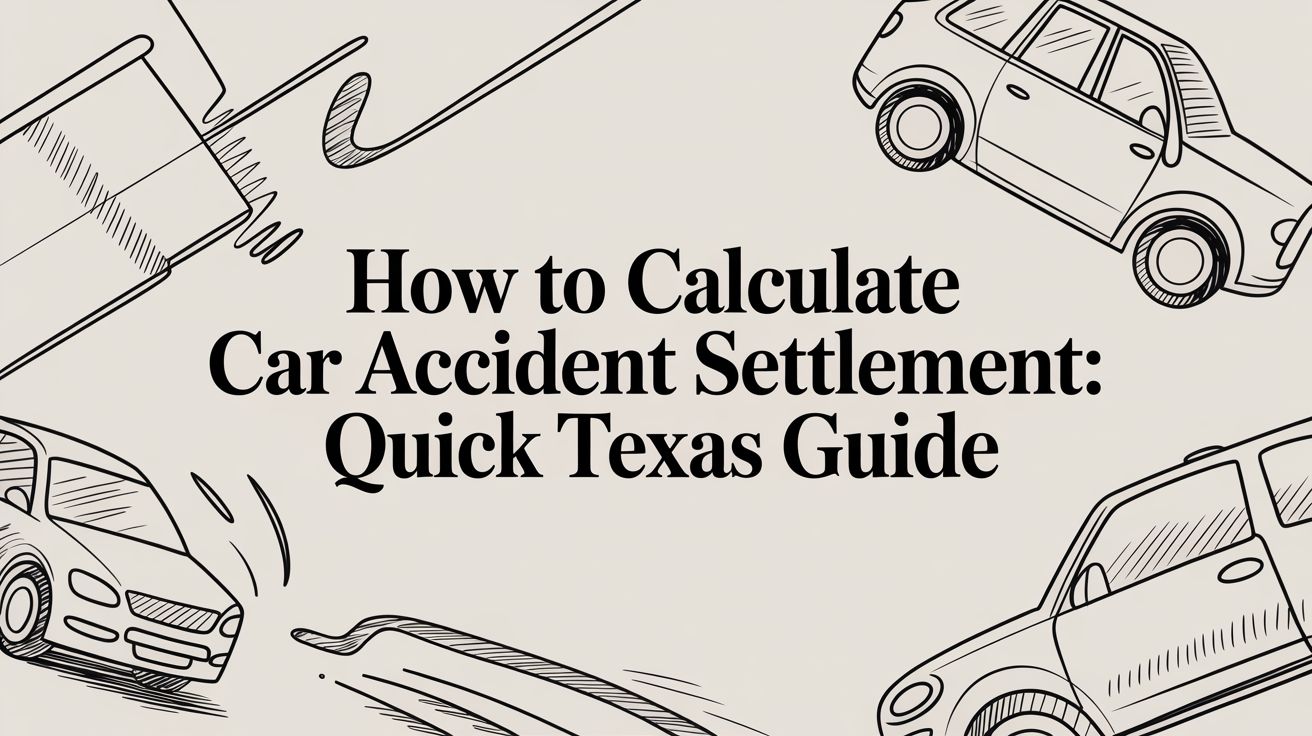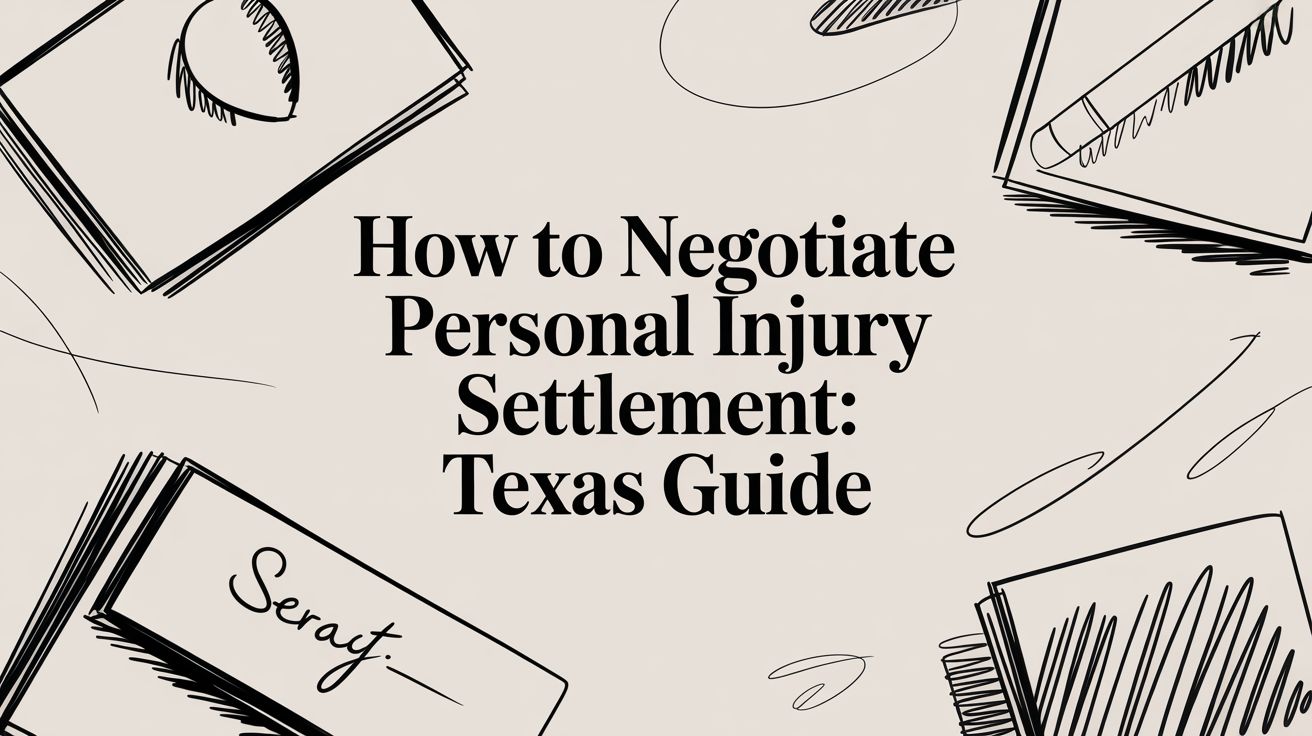A serious accident can change your life in seconds — but you don’t have to face it alone. When you’re injured at work, the path to recovery can seem confusing. The core difference between a workers' comp claim and a personal injury lawsuit boils down to one key idea: workers' compensation is a no-fault system for on-the-job injuries, while a personal injury lawsuit requires proving someone else’s negligence caused your harm. Which path you take will hinge entirely on the specific circumstances of your accident and who was at fault.
Your Guide to Injury Claims After a Texas Workplace Accident
A serious accident at work can turn your life upside down in an instant, leaving you with pain, a mountain of medical bills, and a deeply uncertain future. When you're injured on the job here in Texas, understanding your legal options is the first critical step toward getting back on your feet and rebuilding your life.
While both workers' compensation and personal injury claims are designed to help you recover, they are fundamentally different legal roads with their own unique rules, processes, and potential outcomes.
One of the biggest distinctions is the context. Workers' compensation is an insurance system created specifically for injuries that happen in the course of employment, offering a more direct path to medical care and partial wage replacement. In contrast, personal injury claims can arise from almost any situation where someone else's carelessness causes harm, from car accidents to slip and falls. You can find more statistics on the scope of personal injury claims on clio.com.
Our goal is to give you the clear, straightforward information you need to understand your rights and make the best decision for yourself and your family. The table below gives you a quick, high-level overview of how these two types of claims stack up.
At a Glance: Workers' Comp vs. Personal Injury
| Feature | Texas Workers' Compensation | Texas Personal Injury Lawsuit |
|---|---|---|
| Basis of Claim | No-fault system. You receive benefits regardless of who caused the injury. | Based on negligence. You must prove another party’s carelessness caused your injury. |
| Who You Can Sue | You generally cannot sue your employer if they carry workers' comp insurance. | You can sue any negligent party, including third parties like other drivers or manufacturers. |
| Available Damages | Limited to medical bills and a percentage of lost wages. No pain and suffering. | You can recover a full range of damages, including medical costs, lost income, and pain and suffering. |
| Typical Scenario | An employee in San Antonio is injured by an equipment malfunction at a job site. | A delivery driver is hit by a distracted driver on a Houston freeway while making a delivery. |
How Texas Workers' Compensation Works

Think of workers' compensation in Texas as a special insurance policy your employer carries to cover injuries that happen on the job. The most important thing to understand about it is that it’s a ‘no-fault’ system.
This is a critical distinction. It means you are entitled to benefits no matter who caused the accident—whether it was your mistake, a coworker’s, or your employer’s. You don’t have to prove anyone was negligent to get the help you need.
The system is designed to provide fast medical care and financial support, avoiding the lengthy legal battles that often come with proving fault. The goal is to get you treated and cover a portion of your lost income so you can focus on your recovery without the added stress of a lawsuit.
The Benefits Provided by Workers' Comp
When you have a successful workers' comp claim in Texas, you're eligible for a specific set of benefits. These are designed to handle the immediate medical and financial fallout from a workplace accident.
These benefits usually cover:
- Medical Benefits: Pays for all necessary medical care for your injury. This includes everything from doctor visits and hospital stays to physical therapy and prescriptions.
- Temporary Income Benefits (TIBs): Replaces a percentage of the wages you lose while you’re out of work recovering.
- Impairment Income Benefits (IIBs): Provides compensation if your work injury leads to a permanent impairment affecting your body as a whole.
- Lifetime Income Benefits (LIBs): Reserved for the most severe, catastrophic injuries, such as the loss of limbs or total blindness.
For example, imagine a roofer in Houston who slips and falls off a ladder, breaking his ankle. It was a simple accident, but it keeps him off his feet for weeks. Workers' comp provides a direct way for him to get his medical bills paid and receive income benefits while he heals, all without having to sue his boss.
The core idea behind Texas workers' compensation is a trade-off. By accepting these no-fault benefits, you typically give up your right to sue your employer over the injury. This is what's known as the "exclusive remedy" rule.
The Exclusive Remedy Rule Explained
This rule is the foundation of the workers' compensation system. If your employer has workers' comp insurance, it becomes your only legal path to recovery from them. You can't turn around and file a personal injury lawsuit against your company for things like pain and suffering, even if their negligence directly caused your injury.
This is a major difference when you compare workers' comp vs. personal injury claims. While workers' comp is faster and more certain, it also puts a cap on the type and amount of compensation you can get. This legal shield for employers is the reason the system was created.
However—and this is important—the exclusive remedy rule only protects your employer. If a third party was responsible for your accident, you may still have a separate personal injury claim against them. For instance, if you were hurt by a faulty piece of equipment on a job site, you could pursue a claim against the manufacturer while still collecting your workers' comp benefits.
Understanding a Texas Personal Injury Lawsuit
A personal injury lawsuit is built on a totally different foundation than workers' comp: fault. This isn't just about getting some of your bills paid. It’s about holding a negligent person or company fully accountable for the harm they caused you.
To win a personal injury claim, your attorney must prove that another party’s carelessness—what Texas law calls negligence—was the direct cause of your accident and injuries. This is a fight for justice and a complete financial recovery that helps you and your family move forward.
After a Houston freeway crash, for example, a delivery driver might be left with serious injuries. If a distracted motorist was texting and driving, a skilled Houston car accident attorney would help the injured driver file a personal injury claim against that motorist. This opens the door to compensation that goes far beyond what workers' comp could ever offer.
The Role of Negligence and Comparative Responsibility
In Texas, negligence is the heart of every personal injury case. To prove it, your lawyer has to establish four critical elements:
- Duty: The at-fault party had a legal responsibility to act with reasonable care (like a driver’s duty to obey traffic laws).
- Breach: They failed to meet that duty through a careless or reckless act.
- Causation: Their failure directly caused your injuries.
- Damages: You suffered real harm, like medical bills, lost income, and physical pain.
Texas also uses a rule known as modified comparative responsibility, sometimes called proportionate responsibility. This means that if you were partially to blame for the accident, your compensation can be reduced by your percentage of fault. The good news is you can still recover damages, as long as you aren’t found to be 51% or more responsible for what happened.
Recovering Full Compensation for Your Losses
Unlike the strictly limited benefits of workers' compensation, a personal injury claim allows you to demand payment for the full scope of your damages. This is where the two paths truly diverge. Workers' comp provides more predictable, insurance-covered benefits, but personal injury claims can lead to much higher payouts, especially when catastrophic injuries are involved.
A personal injury lawsuit allows you to seek compensation for:
- All past and future medical expenses
- All lost wages and loss of future earning capacity
- Physical pain and suffering
- Mental and emotional anguish
- Disfigurement and physical impairment
A personal injury claim is about making you whole again. It forces the responsible party to answer for the full impact the accident has had on your life—physically, financially, and emotionally.
Knowing how the process works is the first step toward standing up for your rights. You can read our detailed guide on how to file a personal injury claim for more information. For a broader look at this area of the law, you can also find helpful resources on general personal injury law.
Comparing Your Legal Options Side by Side
When you get hurt on the job, figuring out what to do next can feel overwhelming. To make things clearer, let’s break down the real differences between a Texas workers’ compensation claim and a personal injury lawsuit. This isn't just about legal definitions; it's about what matters most to you and your family right now—who is held accountable, what you have to prove, and the kind of recovery that's actually possible.
Seeing these two paths side-by-side helps you see which one fits your specific situation. The biggest thing to understand is the "exclusive remedy" rule in workers' comp. If your employer has this coverage, it generally shields them from being sued. That’s a massive contrast to a personal injury claim, where the entire point is to hold a negligent party fully responsible for all the harm they caused.
Who Is Responsible for Your Injuries?
With a workers' compensation claim, the whole question of "fault" gets tossed out the window. The system is built to provide benefits no matter who caused the accident—you, a coworker, or your boss. The responsible party is simply the workers' comp insurance carrier, which pays out set benefits according to state law.
A personal injury lawsuit, on the other hand, is all about fault. Your case is focused on proving that another person or company’s carelessness is the direct reason you were injured. For instance, if a defective piece of equipment on a job site hurt you, a personal injury claim wouldn't target your employer. Instead, it would go after the manufacturer of that faulty machine—a separate, negligent third party.
This decision tree infographic helps visualize the core questions that determine the path your personal injury claim might take.
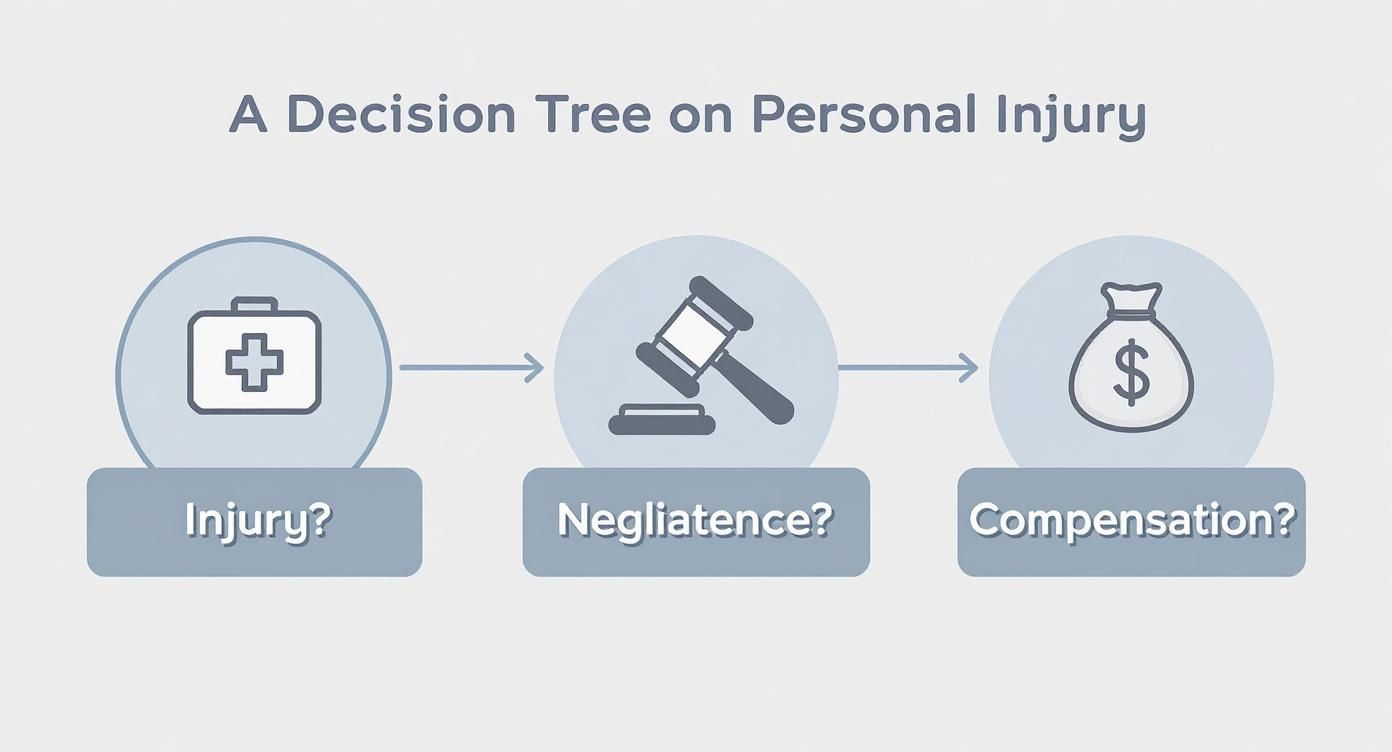
As the infographic lays out, proving that someone else was negligent is the critical pivot point that opens the door to pursuing full and fair compensation through a lawsuit.
What Do You Need to Prove?
The burden of proof is probably the single biggest difference in the workers comp vs personal injury debate.
- Workers’ Compensation: All you need to show is that your injury happened "in the course and scope" of your employment. It’s a no-fault system, meaning you don’t have to prove your employer did anything wrong.
- Personal Injury Lawsuit: Here, you absolutely must prove negligence. This involves showing that another party had a duty to act with reasonable care, they failed to do so, and that failure directly caused your injuries and all the damages that followed.
This difference in what you have to prove is huge. While workers' comp is a more direct path to getting some benefits, a personal injury claim is the only way to get a complete financial recovery by holding the at-fault party fully accountable.
What Compensation Can You Recover?
The financial recovery available through each system is drastically different. For many injured workers and their families, this is the most critical factor when trying to plan for a future that’s been turned upside down by a serious accident.
Workers’ compensation provides specific, limited benefits that are strictly defined by Texas law. These are designed to cover the immediate financial hit from an injury and include:
- Medical Care: Payment for all reasonable and necessary medical treatment for the work injury.
- Income Benefits: A percentage of the wages you've lost while you're unable to work.
- Impairment Benefits: Compensation for any permanent physical impairment you're left with.
A personal injury lawsuit allows you to fight for a much wider range of damages to cover the full spectrum of your losses. This covers not just the economic costs but also the non-economic damages that acknowledge the real human cost of an injury. A successful claim can secure money for:
- All past and future medical bills, with no caps.
- All lost wages and your diminished ability to earn a living in the future.
- Physical pain and suffering.
- Mental and emotional anguish.
- Disfigurement and physical impairment.
Think about a Dallas construction worker who suffers a catastrophic injury after a crane collapses because a third-party operator was negligent. He could file a personal injury claim to seek compensation for a lifetime of medical needs and the profound emotional distress from his ordeal—damages that are completely off the table in workers' comp alone. If a family lost a loved one in that accident, a wrongful death lawyer in Texas could help them pursue justice.
The table below gives you a clear, at-a-glance summary of these key differences.
Workers Compensation vs Personal Injury At a Glance
This table highlights the fundamental differences between workers' compensation claims and personal injury lawsuits in Texas.
| Feature | Texas Workers Compensation | Texas Personal Injury Lawsuit |
|---|---|---|
| Basis of Claim | No-fault (injury must be work-related) | Fault-based (must prove another's negligence) |
| Who Pays | Your employer's insurance carrier | The negligent party or their insurance company |
| Suing Your Employer | Generally not allowed (due to exclusive remedy rule) | Allowed if employer is a "non-subscriber" or in cases of gross negligence |
| Available Damages | Capped medical, partial lost wages, impairment benefits | Full medical, full lost wages, pain and suffering, emotional distress |
| Proof Required | Proof of injury during course and scope of employment | Proof of duty, breach, causation, and damages |
| Primary Goal | Provide swift, limited benefits to injured workers | Make the victim whole by recovering all losses from the at-fault party |
Ultimately, understanding these distinctions is the first step toward protecting your rights and securing the resources you need to move forward.
When Your Work Injury Involves a Third Party

A serious workplace accident can leave you feeling trapped, especially when you learn that workers' compensation is your "exclusive remedy" against your employer. But here's something many injured workers don't realize: a single accident can open the door to both a workers' comp claim and a separate personal injury lawsuit.
This is possible when a third party—someone other than your employer or a coworker—is responsible for your injuries. While workers' comp shields your employer, it offers zero protection to a negligent third party. You have every right to hold them accountable and seek full compensation for the harm they caused.
Identifying Third-Party Negligence
So, what does a third-party claim look like in the real world? It can happen in countless ways across just about any job. The key is to pinpoint an at-fault person or company that isn't your direct employer or a colleague.
Here are a few common scenarios our clients face:
- A Defective Product: A factory worker in Austin is severely injured when a piece of machinery malfunctions due to a faulty design. They can receive workers' comp benefits while also filing a product liability lawsuit against the machine’s manufacturer.
- A Negligent Driver: A salesperson is driving to a client meeting and gets hit by a drunk driver on a San Antonio highway. They have a workers' comp claim because they were on the clock, plus a personal injury claim against the impaired driver.
- Unsafe Property Conditions: An electrician is sent to a commercial property to perform repairs and falls through an unmarked, rotted section of the floor. They can collect workers' comp and sue the property owner for failing to maintain a safe environment.
These examples show how your path to justice can be broader than you might think. You don’t have to choose one remedy over the other.
The ability to pursue a third-party claim is a game-changer. It allows you to seek compensation for pain and suffering, emotional distress, and other damages that are completely unavailable through the Texas workers' compensation system.
The Advantage of Pursuing Both Claims
Filing a third-party personal injury lawsuit while your workers' comp claim is active is a powerful strategy. It allows you to access the immediate medical and wage benefits from workers' comp while your attorney builds a case to recover the full scope of your losses from the negligent party.
The two claims work in parallel to provide both short-term stability and long-term security.
For example, imagine a delivery driver injured in a collision with a large commercial truck. The workers' comp benefits would help cover their immediate medical bills. At the same time, a skilled truck crash lawyer Houston would investigate the trucking company for potential negligence—things like hiring an unqualified driver or failing to maintain the vehicle. You can learn more about the crucial steps to take by reading our guide on what to do after a truck accident.
This dual approach ensures you aren't limited to the capped benefits of workers' comp. It opens the door to holding all responsible parties accountable and fighting for the resources you truly need to rebuild your life. An experienced Texas personal injury lawyer can evaluate your accident to determine if a third party shares blame for your injuries.
How a Texas Personal Injury Lawyer Can Help
Navigating the aftermath of a workplace accident can be incredibly confusing and overwhelming. A serious injury can flip your life upside down in a matter of seconds—but you don't have to face the legal chaos alone. An experienced Texas personal injury lawyer is your most powerful ally in getting the resources you and your family need to heal.
One of your attorney's first and most important jobs is to conduct a thorough, independent investigation into your accident. We look far beyond the initial report to pinpoint every single party who might be at fault. This could include your employer, third-party contractors, a negligent driver, or even the manufacturer of faulty equipment.
This step is critical because it reveals every possible path to compensation available to you.
Maximizing Your Financial Recovery
We will carefully analyze the details of your case to determine if you have a valid third-party personal injury claim in addition to any workers' comp benefits. Pursuing a third-party claim is often the key to unlocking full compensation for damages like pain and suffering, which workers' comp simply doesn't cover. This can dramatically increase the total financial recovery you receive.
A skilled attorney will also take over all communications with insurance companies on your behalf. You should know how to handle insurance companies, as they are not on your side.
Insurance adjusters are trained to minimize payouts. Your lawyer's role is to protect you from their tactics, reject lowball settlement offers, and fight for the true value of your claim.
We manage all the paperwork, negotiate aggressively for you, and make sure you are never pressured into accepting a settlement that is less than you deserve.
Protecting Your Rights and Your Future
Most importantly, your attorney ensures you meet every critical deadline. In Texas, the statute of limitations for filing a personal injury lawsuit is generally just two years from the date of the injury. If you miss this deadline, you lose your right to seek justice forever. We protect you from this risk. When you call a lawyer, you gain a partner dedicated to safeguarding your future.
You don’t have to face this uncertainty on your own. A free, no-obligation consultation with our firm can bring immediate clarity and relief. We'll listen to your story, answer your questions, and explain your rights in plain English, offering a supportive and empowering path forward.
How Long Do You Have to File a Claim in Texas?
When you're hurt on the job, everything feels uncertain. The legal system can seem like a maze, but getting clear, straight-up answers is the first step to getting back on your feet. Here are some of the most common questions our clients ask when trying to figure out the difference between workers' comp and a personal injury lawsuit in Texas.
Having this information helps you understand your rights and the legal paths available to you and your family. It's about regaining control.
Can I Sue My Employer if I Get Hurt at Work in Texas?
This is the big question, and the answer almost always comes down to one thing: insurance. If your employer has Texas workers' compensation insurance, you generally can't sue them for your injury. This is because of the "exclusive remedy" rule, which makes workers' comp your only path to recovery directly from your employer.
But there's a huge exception. If your employer is a "non-subscriber"—meaning they chose not to buy into the state's workers' comp system—you absolutely have the right to file a personal injury lawsuit against them if their negligence caused your accident.
What if My Employer Doesn't Have Workers' Comp Insurance?
Texas is unique in that it lets private employers decide whether or not to carry workers' compensation coverage. If your employer is a non-subscriber and their carelessness led to your injury—maybe by providing you with unsafe equipment or failing to provide proper training—you can sue them directly.
In these personal injury lawsuits, non-subscribing employers are stripped of certain common-law defenses, which can make your case much stronger. A Texas personal injury lawyer can dig in to find out your employer's insurance status and build a powerful negligence claim if they failed to keep you safe.
What is the Statute of Limitations in Texas?
The deadlines, known as statutes of limitations, are incredibly strict and are completely different for each type of claim. If you miss these deadlines, you could be permanently blocked from getting any compensation at all.
- Texas Workers' Compensation: You must report your injury to your employer within 30 days. After that, you have to file your official claim with the Division of Workers' Compensation within one year of the date you were hurt.
- Texas Personal Injury Lawsuit: For a personal injury claim, whether it's against a non-subscriber employer or a third party, you generally have two years from the date of the injury to file your lawsuit in court.
It is absolutely critical to act fast to protect your rights. A Texas work injury lawyer who knows the system can make sure every deadline is met, preserving your chance to fight for the full compensation you deserve.
Workplace accidents aren't just a local problem; they're a global one. To put things in perspective, the European Union recorded 2.82 million non-fatal work accidents in 2023 that kept people out of work for at least four days. You can read more about these workplace accident statistics to see the bigger picture.
A serious workplace injury can leave you feeling lost, but you don’t have to find your way forward alone. At The Law Office of Bryan Fagan, PLLC, our dedicated team is here to provide the clear answers and aggressive representation you need. We will investigate your accident, explain all your legal options, and fight to secure the maximum compensation available for you and your family. Your recovery is possible, and legal help is available. Schedule a free, no-obligation consultation today to learn how we can help you take the next step.


